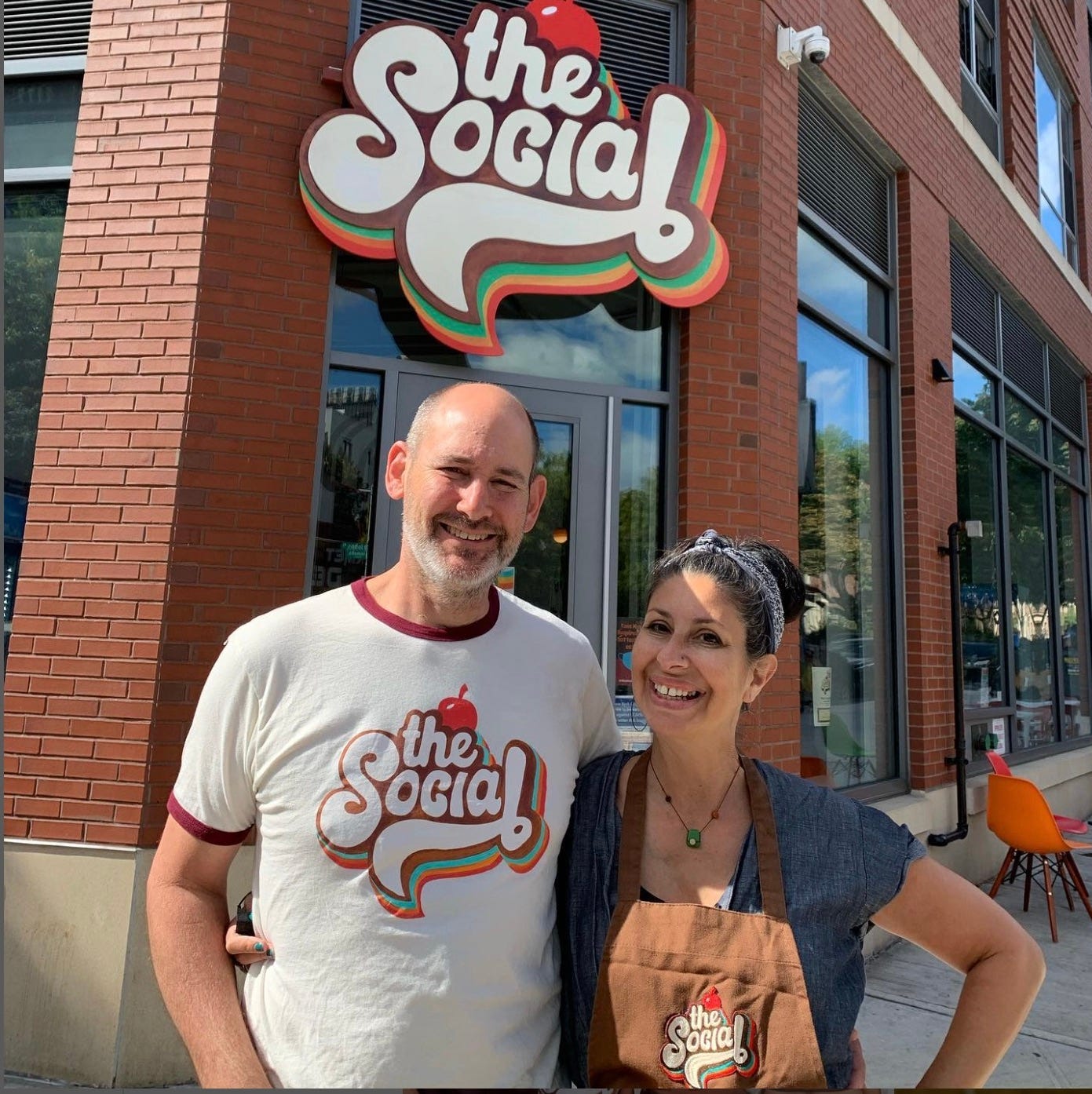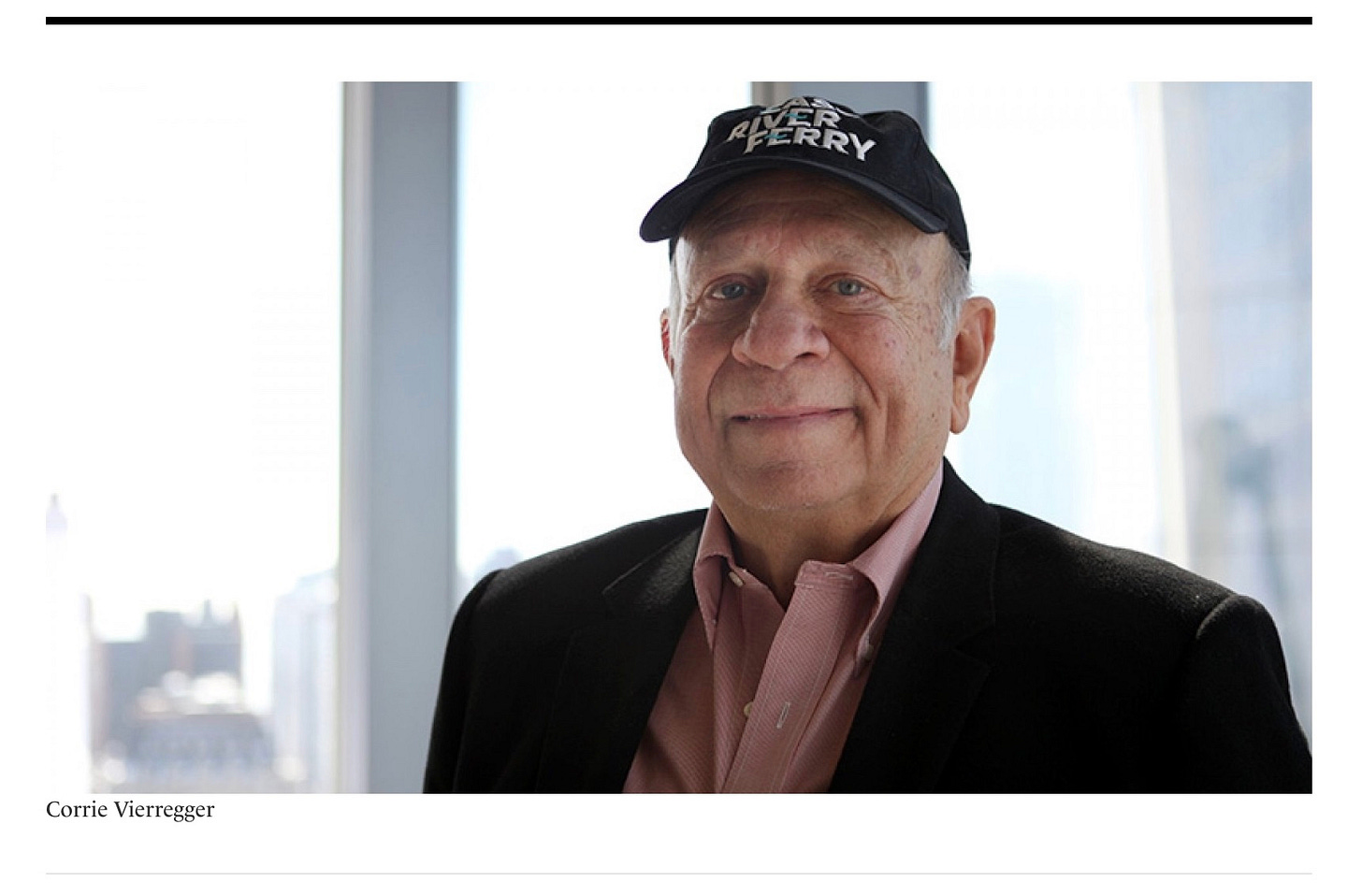What Really Happened at Ample Hills?
Founders Jackie Cuscana and Brian Smith on being fired from their own company.

On Friday November 17th, 2023, six months after Jackie Cuscuna and Brian Smith had regained control of their beloved ice cream brand Ample Hills Creamery, the couple was called into a meeting at Camp David in Industry City where their production facility is located.
Smith had recently finished churning his latest flavor, one that, unbenowst to him, would be his last. It was called “Spread Love the Brooklyn Gives Way;” it was a vanilla and malted ice cream base, with cascades of rainbow cookies. Proceeds were to go to Brooklyn Gives, a charity uniting Brooklyn donors and nonprofits in support of social change in honor of #GivingTuesday.
Their CEO, Lisa Teach, opened the door to the meeting space; inside sat their two lead investors, Norm Brodsky and Shlomo Birnbaum. The meeting, which Smith recorded, lasted three minutes and four seconds. “It started with an awkward series of hellos,” said Smith, “followed by the lead investor, Norm Brodsky, quickly adding: “You’re both fired, effective immediately. Any questions, anything else?” Smith replied: “Just one question, why?” “You don’t want to know Brian, you don’t want to know,” said Brodsky. “This meeting’s over.”
The saga of Ample Hills is one you’ve no doubt heard of, but as is often the case, you don’t know the half of it. That is until now.
The background, in a nutshell: Jackie Cuscuna and Brian Smith were high school teachers with a somewhat ridiculous love of ice cream. After years of tinkering with recipes at home, they opened a sweet scoop shop on a picture-perfect corner of Vanderbilt Avenue in Brooklyn called Ample Hills Creamery in 2011.
Within a decade, they had grown the business into a 16-unit ice cream flagship, backed by a team of investors with a CPG business shipping cold creamy pints to local and national retail shops. But by 2020, the operators filed for bankruptcy, and Cuscuna and Smith were forced to sell off the business to a company called Schmitt Industries for $1 million. Personal bankruptcy followed. The dream, and nearly everything that went with it, was lost.
Devastated by a very public failure, the couple retreated into the cocoon of their family and friends. In time, they regrouped and began toying around with some ideas for a new business, something with homemade donuts and ice cream, a concept they were calling The Social. They were seeing a business coach, Diana Zelvin, who recommended that they perhaps speak with Norm Brodsky, the founder of CitiStorage who was a well known entrepreneur and advisor, and someone who had weathered a bankruptcy himself. Zelvin thought he might be a good sounding board.
Cuscuna and Smith met with Brodsky and his team of investors – Shlomo Birnbaum and Lisa Teach. As it turned out, they were not only interested in sharing advice; they wanted to invest in their new ice cream and donut idea. Together, they launched The Social in the summer of 2021.
Fast forward two years; in May of 2023, news came that Ample Hills was on the foreclosure floor; Schmidt Industries had run it into the ground, closing all 12 remaining locations in a short time span, following allegations of unpaid rent and underreporting their financials as a publicly traded company. They were delisted on Nasdaq and were on sale for pennies, a mere $150K.
Cuscuna and Smith wanted their baby back; Brodsky and his team agreed to buy it out of liquidation and create a new company, Do-Nut Hills, with the purchase of the Ample Hills Intellectual Property and three leases: Vanderbilt Avenue, Astoria, and the Upper West Side. Brodsky installed their investor, Lisa Teach, a former Five Guys franchise owner, as CEO, and demanded that the shops open by summer.
“They wanted everything to open very quickly, and one of the caveats they presented to us was that they wanted to appoint Lisa as CEO,” Cuscuna told me during a two hour conversation this week. “Now that the business was bigger, we knew we needed the help, and Lisa seemed great.”
The relationship started off with roles clearly defined, but soon it became clear, they were too rigid. “The idea was that Lisa would operate and oversee the financial guardrails, while I made ice cream, and Jackie oversaw the culture, customer service and community of the shops, while also focusing on marketing and social media,” Smith recalled. But what was left out of the equation was collaboration and communication. Cuscuna and Smith were told to “stay in their lanes.”
“If this were a healthy investment relationship, we should have talked about the business needs, the vision, the planning, and our goals for a relaunch,” said Cuscuna. “But we were never given a voice. We were just told we need to open fast to get cash flow happening in summer. To not be in these conversations felt wrong. It felt like we were going to have issues. But no one ever slowed down long enough to hear us out.”





To open at warp speed, they needed to find a production kitchen and fast. They leaned on their longtime friends Dawn Casale and Dave Crofton of One Girl Cookies (OGC) who were moving out of Industry City and looking for replacement tenants. They were able to strike a deal, get into the OGC space and start making ice cream nearly overnight, even before OGC vacated. “It was crazy, we were all on top of each other, but we made it happen because Dawn and Dave helped us and knew we needed to open so quickly,” Cuscuna told me.
They also worked to get leases in line and other backend functions in place. “We hired a great bookkeeper, and we were able to get the leases done,” Cuscuna said. “The landlord of the Vanderbilt shop is a close and wonderful friend to us. These deals would never have happened with the speed they wanted had it not been for the relationships that Brian and I cultivated over the years.”
Mid-summer came and went and the shops were up and running, though not without issue. The stores had been opened too fast, labor costs were too high, and the shops were not capitalized well. Another consequence of the shops being open too fast was not having the time and ability to train the teams.
“We opened too haphazardly,” said Cuscuna. “It was a constant state of putting out fires as opposed to a thoughtfully orchestrated operational plan. I thought we should try to take a little more time to set these shops up for success.”
Other logistics were being ignored or changed without the founders’ knowledge. For instance, their ice cream pints were always 16 ounces, but when Schmidt Industries purchased Ample Hills, they followed an industry trend to shrink pints to 14-ounces to increase profit. “We didn't want to do that ever, so when we had the business back, all of us and the investors agreed we would go back to a 16-ounce pint,” Cuscuna told me. So she ordered 10,000 16-ounce pints, only to learn that they were not going to use 16-ounce pints in the shops after all. “We argued with Lisa, but she said no, it’s out of my hands.”
In early October 2023 a local investor approached the company about purchasing it. The founders knew this investor from Brooklyn; he had successfully launched other businesses, and they were excited about the prospect of finding new owners who shared their vision. They connected him to Brodsky about a possible purchase, but after several weeks of meetings, the parties couldn't come to an agreement; they were too far apart when it came to price.
On November 8th, Brian and Jackie were in the Green Room at the Tamron Hall Show, unveiling a new flavor for the host, when they received an email from Brodsky’s lawyer stating that The Social had defaulted on a Promissory Note. The Note referred to a loan given to The Social during the Winter of 2021 when the Omicron variant surged and the business needed a capital float. “The variant was raging and we had to borrow more money to keep The Social going,” said Cuscuna. “At the time, Norm said sure we will give you a loan, sign this promissory note.”
Tucked into that Promissory Note to The Social was a clause that the founders never read; it said the pair could be fired from their roles if they defaulted on the loan. “This was our shortcoming,” said Cuscuna. “We just signed it. We trusted him and we didn't read it or have a lawyer look at it.”
When it came time for the note to be repaid in the fall of 2021, Brodsky told them to hold off. He said don’t bother, wait until the business is more profitable,” Smith said. Unfortunately, the conversation wasn't in writing.
When reached today for comment, Brodsky said the founders always had an attorney representing them and that he “does not remember saying hold off on paying this loan.” “Even if I did say they should hold off,” he continued, “it would not be valid because you need to have something in writing.”
Brodsly says he fired them for the “greater good” of the company. “They didn’t get along with the CEO, true, but they were terminated for other reasons that I wont get into at this moment. When I run businesses, I consider two things: profits and making sure employees have a job and get paid. They were interfering with that. We have 50 employees in the winter and 100 in the summer, and in order to protect our employees and our profits, they were terminated.”
The couple disputes this claim; they believe that their support of the potential sale of the company was the reason they were summarily dismissed. “Brodsky probably saw our interest in a different owner as disloyal to him,” said Cuscuna.
The founders were not given severance, though they still have a 28% ownership stake in The Social, which has not yet been addressed. They were never given employment contracts; while they have emails detailing their salaries and an offer of 20% equity stake Do-Nut Hills, in the rush to get the stores open, the contracts were never drafted or signed.
“We trusted our investors,” said Smith. “It’s hard to live in a world without trust, where you assume others are bad actors. In retrospect, what should we have done? If we had stopped working, if we said, that’s it, no more until we have a contract and equity in writing, then what? Everything would have collapsed. The shops wouldn’t have opened, staff wouldn’t have been hired, ice cream wouldn’t have been made. We’d have been doing damage to the brand we just got back. Except WE didn’t get it back. The investors did.”
For now, the couple is in a state of shock and grief; once again their ice cream is being made and sold by someone else. But they are also looking inward, for answers, for yet another lesson to be learned.
“For my own purposes, I want to see if there was anything I could have done differently to change the outcome,” Smith wrote in a LinkedIn Post this week. “The unexamined life is not worth living, right? But also for those of you out there that are founders yourselves, or investors working closely with founders, perhaps our misfortune, our mistakes, will in some small way serve as a guide for what not to do.”






The only thing more remarkable than this pair's ability to run businesses into the ground is their continued insistence that they are the victims, every time.
The "T" word: trust! I've seen my share of bad business outcomes made by people who make business decisions solely on trust.
It is sad.